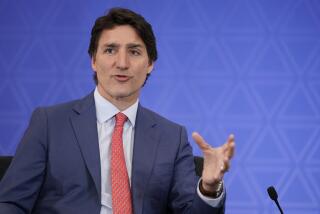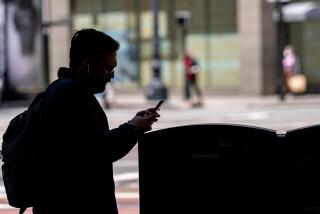BlackBerry makes a deal to stay active in India
- Share via
Reporting from New Delhi — India’s BlackBerry users breathed a sigh of relief Tuesday as word spread that their beloved smart-phone devices would keep beeping after Aug. 31, the deadline New Delhi had set for the company to either open up its technology or shut down its service.
BlackBerry’s Canadian parent company reportedly agreed to copy Indian security agencies on client e-mails and short messages, local news reports said Tuesday, citing government sources. The agencies initially must make a specific request but after November reportedly will receive automatic data feeds. Many of the technical details are still being hammered out.
Indian users who had braced for the worst expressed relief.
“I’ve been so concerned because my life revolves around this thing,” said Kamini Sharma, 35, a business owner, going through her e-mails in a doctor’s office. “The security concerns are fair, but I don’t want to be shut out.”
Officials at parent company Research in Motion, or RIM, were not immediately available for comment. But if the widespread local reports are borne out, the deal in the world’s fastest growing mobile phone market could dent its competitiveness, given that security has been one of its top selling points.
India’s love affair with the BlackBerry is relatively new. Of the nation’s estimated 635 million mobile phone users, only about 1 million have BlackBerries, and the high handset price means most consumers are well-heeled.
Competitors, meanwhile, haven’t exactly been distraught over BlackBerry’s troubles. “IPhone and Nokia are actually quite happy,” said Rajan Mathews, director general of the Cellular Operators Assn. of India, an industry group. “You might see this as a scavenger issue.”
For diplomats and businesspeople in India and elsewhere, sending secure e-mails and text messages is vital. But the Indian government and others fear the service could help terrorists carry out attacks like the one in the city of Mumbai in 2008 in which cellphones and e-mails played a key role.
The government can already monitor voice calls and Internet surfing on the BlackBerry.
As reports of a deal spread, the parent company’s shares fell more than 4% on the Toronto Stock Exchange, even as many users in India cheered. “BlackBerry takes Delhi’s call,” blared one front-page headline. “Crisis is over, hold on to your BlackBerry,” said another.
“I’m very happy at the news,” said David Gaurav, 35, self-employed, BlackBerry in hand as he walked through an upscale shopping market. “Work e-mails, family, social life, it’s all on here.”
India arm-twisted BlackBerry after learning that Saudi Arabia had struck an information-sharing deal this month. The United Arab Emirates, Indonesia, Lebanon and others are angling for similar access.
Indian officials said they could go after Google and Skype next.
The debate has raised privacy concerns. In an article in Tehelka magazine, actor Kabir Bedi wrote: “Who wants the intelligence agencies peeping into their sexual secrets, business secrets, state secrets? None of these policies prevented terrorists from communicating. But they have inconvenienced millions.”
As India’s wealth and economic growth have expanded in recent years, it’s been able to drive a harder bargain with foreign governments and investors.
Infrastructure limitations also play a part in New Delhi’s concerns, analysts said. While the United States and other developed nations have different networks for fixed and mobile telephone service, two-way cable and various proprietary government systems, India essentially has only one big communication highway: its mobile system, developed aggressively in recent years by several fleet-footed companies.
That has prompted the government to shut down large parts of its mobile network, as it’s done periodically in the troubled Kashmir region, when it has security concerns involving even a few bad guys.
“In India there’s really a single thread,” said Mathews of the Cellular Operators Assn. “We’re a liability of our own success, having become the 600-pound gorilla.”
mark.magnier@latimes.com
Anshul Rana in The Times’ New Delhi Bureau contributed to this report.






